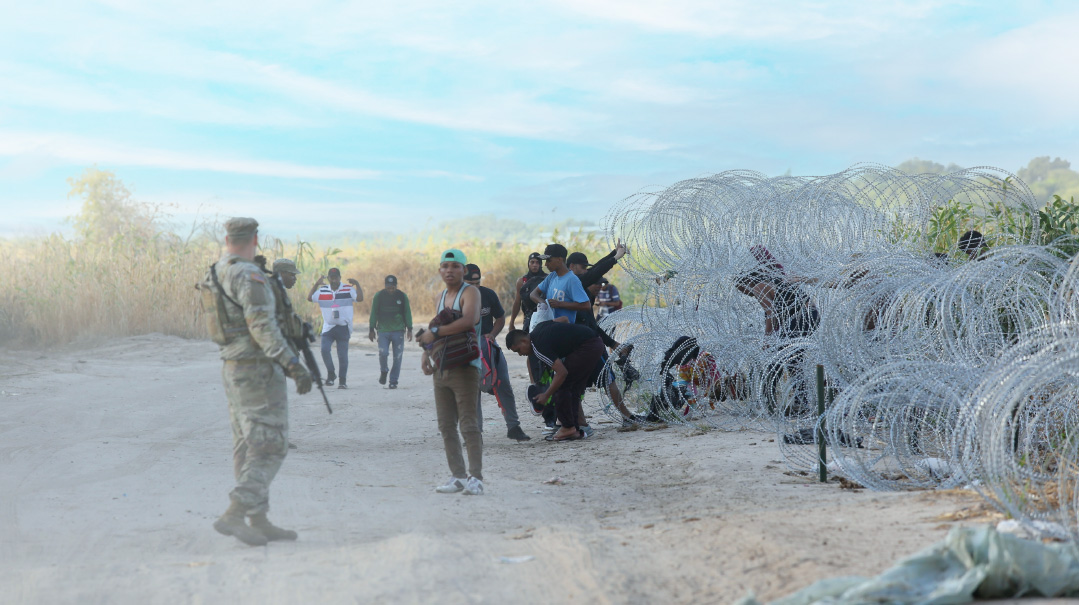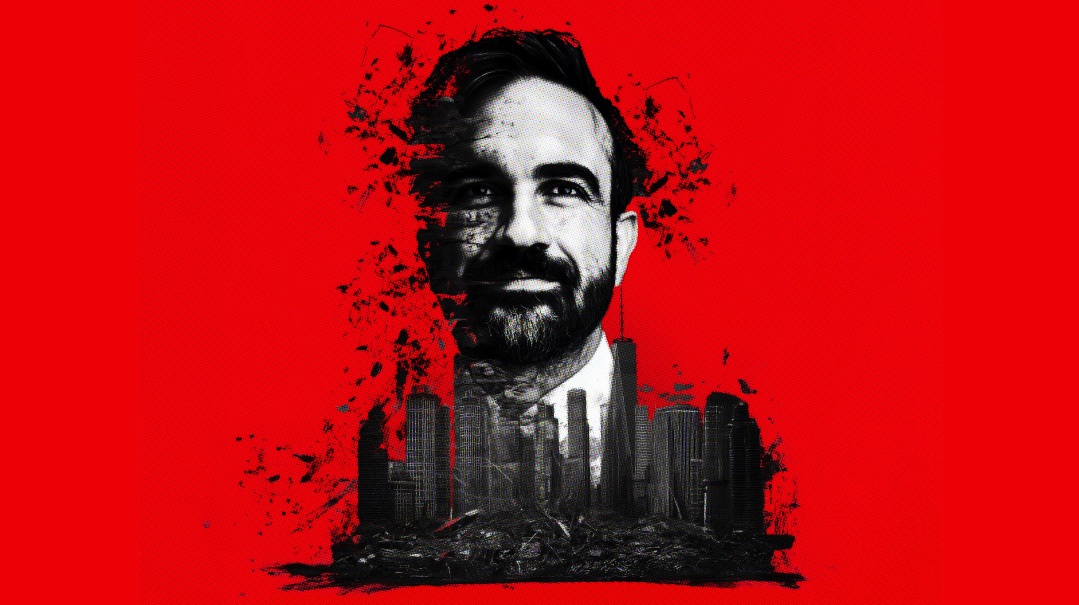Coming Down to the Wire

As a wide-open southern border becomes a 2024 election issue, states are calling Biden’s bluff on immigration

PHOTO: SHUTTERSTOCK / VIC HINTERLANG
T
ension in the United States over skyrocketing illegal immigration was ratcheted up another notch last week in the continuing back-and-forth between the federal government and the state of Texas.
The federal government’s turn came on Monday, January 22, in the form of a Supreme Court order. In a 5-4 ruling, the Court vacated an earlier injunction issued by the Fifth Circuit Court of Appeals. That injunction prohibited the US Customs and Border Protection agency (CBP) from tearing down concertina wire that was installed on the border with Mexico by the Texas State Guard, under orders from Governor Greg Abbott.
Although many have interpreted the Supreme Court ruling as authorizing the CBP to resume tearing down the concertina wire (essentially coiled razor wire), the federal government has taken no action to do so, as of press time. And Abbott pointed out in an interview on Fox News that the ruling did not prohibit him from putting the wire back up.
Eagle Pass, a city of 28,000 in Maverick County, Texas, about 142 miles west-southwest of San Antonio, sits on the front lines of this debate. The town’s economy benefits from a form of “tourism.” On an average day, 6,000 people cross the Rio Grande River from the Mexican city of Piedras Negras into Eagle Pass, often making purchases in the local establishments. On weekends, the number rises to 10,000 — swelling the town population by more than a third. And that’s just from people entering the US legally.
Eagle Pass gained a different form of notoriety a few weeks ago. A 33-year-old woman and two children, ages ten and eight, drowned in the Rio Grande on January 12 while trying to enter the US illegally. (It was unclear whether the three were related.) In 2023, some 700 individuals lost their lives attempting to reach Eagle Pass illegally by crossing the Rio Grande River, which serves as the international border here.
Border Patrol agents within the CBP asserted that their efforts to monitor the area have been impeded by the Texas State Guard. The Biden administration ordered the Border Patrol to remove the razor wire installed by the state of Texas, which triggered the legal battle leading to last week’s Supreme Court decision. The administration said Texas’s policies prevented the federal government from properly securing the border and led to immigrant deaths.
“It is impossible to say what might have happened if Border Patrol had had its former access to the area,” wrote US Solicitor General Elizabeth Prelogar to the Supreme Court.
Texas officials have countered that the federal government has essentially opened the floodgates to illegal immigration. Governor Greg Abbott wasted no time in responding to the Supreme Court ruling.
“President Biden has violated his oath to faithfully execute immigration laws enacted by Congress,” he stated. “Instead of prosecuting immigrants for the federal crime of illegal entry, President Biden has sent his lawyers into federal courts to sue Texas for taking action to secure the border.”
Abbott said his state has been undergoing an “invasion” and emphasized Texas’s constitutional right to defend itself.
While “invasion” is a strong term, the numbers are pretty dramatic. Since the start of 2024, 302,034 people have attempted to cross illegally into the US over the 1,254-mile-long border with Mexico — around 10,000 people a day. That is roughly equivalent to the number of legal US citizens born every day. At that rate, by the time you finish reading this article, around 30 people will have tried to get into the US illegally.
“The people who live on the border — my family, friends, ranchers I’ve known my whole life — they’re angry, they’re tired,” says Selene Rodríguez, policy director of the Texas Public Policy Foundation. “People on the border feel like they can’t be outside with their children. They feel like they can’t go horseback riding on their own ranches.”
Rodríguez, a native of Del Río, Texas, not far from Eagle Pass, says she’s seen the landscape change significantly in recent years. “We’ve seen a huge increase in crime, a huge impact on public resources like our emergency services department, the fire department, health care. Our hospital and clinics are almost going under because of all the resources going toward treating migrants. Whether they’re just crossing over, or coming over right before having a baby, that’s a huge cost to the community and the state.”
Rodríguez pins the blame for this crisis squarely on Joe Biden. “President Clinton was first to build a type of barrier along the border, 30 years ago, and every president since then has understood and publicly stated the need for border security,” she says. “President Biden has dismantled those policies. Now we have record numbers of people coming over.
“It has to come from the top down. There has to be a president who recognizes that border security is the responsibility of the federal government, and we don’t have that in this administration. All we have left is the state of Texas.”
The numbers reported by the US Customs and Border Protection certainly seem to support Rodríguez’s view. During the Trump administration, between 2017 and 2021, CPB agents detained around 3 million would-be illegal immigrants. Under Biden, those numbers have so far reached more than 6 million — and are still rising.
Perhaps searching for a bright spot, major media outlets cast last week’s Supreme Court decision as a victory for the Biden administration. But Jeremy Carl — an immigration specialist who is a senior fellow at the Claremont Institute and former deputy assistant secretary of the Interior under Trump — argues that the ruling actually complicates matters for the president.
“This is the subtlety that, unfortunately, a lot of people missed,” Carl explains. “The Supreme Court did not say that Texas couldn’t put up barbed wire. It simply said the Feds could take it down. And that puts the ball in Biden’s court.
“I think that’s a lose-lose proposition for Biden. It’s going to be extremely hard. The optics of him having to send troops in to essentially keep the Texas National Guard from securing the border are not good. I just can’t imagine him doing it. And the states are now calling his bluff.”
Carl points out that there is much more at stake in this dispute between Texas and Uncle Sam than can be seen at first glance. Governor Abbott’s stance has garnered strong support from Republicans, who know that their current leader, Trump, has a looming expiration date.
“I think this is really the opportunity for Abbott,” Carl says. “For me, speaking as a conservative activist, Abbott is not really our guy. He’s not been horrible, but he’s been much more cautious, more establishment-oriented. And I think he may see the overwhelming response that he’s gotten to this. In 24 hours, he had 32 million views of the tweet [of his statement], with 140,000 likes. I would be surprised if he’s ever had a tweet with that much activity.
“This is the hunger among Republican voters, looking for somebody who will more directly confront federal power. And that’s really the opportunity for Greg Abbott. If he is the guy who leads that charge, I think he’s going to put himself in the driver’s seat. The 2028 election is going to be wide open.”
(Originally featured in Mishpacha, Issue 997)
Oops! We could not locate your form.







